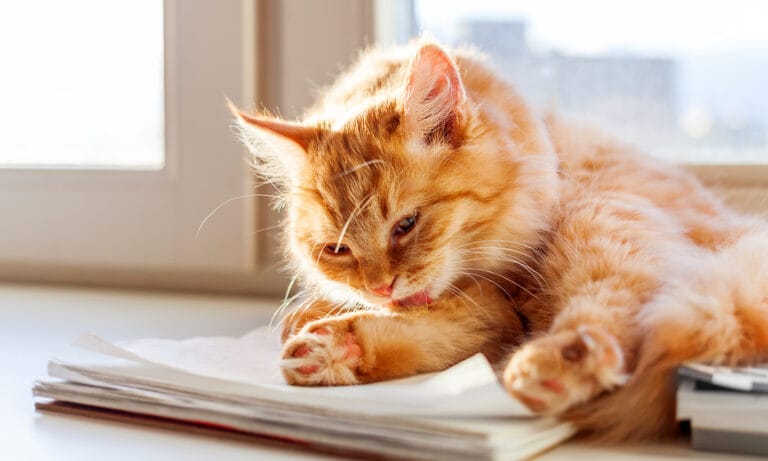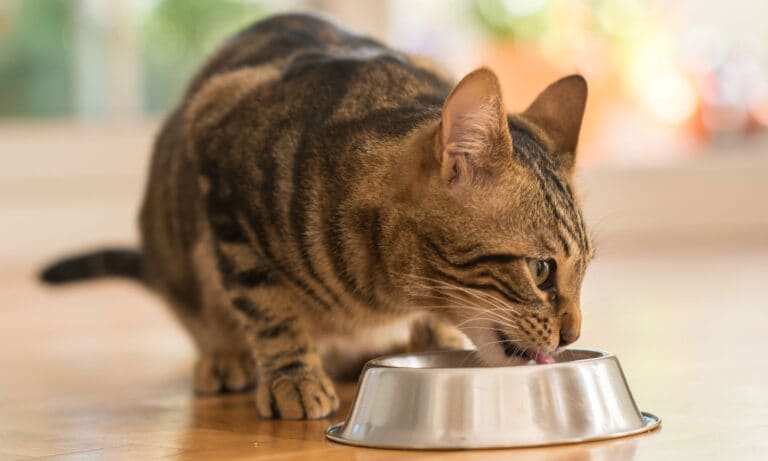There are common cat diseases that are caused, at least in part, by genetics. But, why should pet parents care? Well, if you know your cat’s risk factors, you may be able to prevent problems or manage them better than you would otherwise.
Purebreds have quite the reputation when it comes to genetic diseases, but that doesn’t mean that the “mutts” of the feline world get a pass. In fact, the first disease on our list is not only the most frequently diagnosed feline genetic disease but is also one that can affect any cat regardless of breed.
Let’s look at 10 cat diseases that have a genetic basis and vet-recommended ways of dealing with them.
1. Feline Lower Urinary Tract Disease (FLUTD)
FLUTD, which also goes by the names feline urologic syndrome (FUS) or feline idiopathic cystitis (FIC), affects “approximately four percent of all cats” according to Dr. Jerold S. Bell, adjunct professor of clinical veterinary genetics at the Cummings School of Veterinary Medicine at Tufts University.
FLUTD is a complex disorder. Things like genetics, stress, excess body fat and dietary changes all tie into why a cat may develop FLUTD.
Cats with FLUTD typically have discomfort when they urinate, strain when going to the bathroom and produce small amounts of urine frequently. They also may have urinary accidents. It is not unusual for cats to have multiple flare-ups throughout their lives.
Treatment for FLUTD involves:
- Dealing with stress effectively (Feliway plug-in diffuser can help)
- Providing ample opportunities for physical and mental exercise (break out the cat toys)
- Promoting water intake (e.g., feeding canned cat food only)
Encouraging frequent urination by providing multiple, clean litterboxes throughout the home, and sometimes special prescription cat food and Prescription Urinary Tract & Kidney Medication
2. Polycystic Kidney Disease
Any cat can develop kidney disease, but polycystic kidney disease in cats is most commonly diagnosed in Persians, Himalayans, and related breeds due to a genetic defect.
The kidneys of affected cats develop multiple fluid-filled cysts that disrupt kidney function eventually leading to kidney failure.
Symptoms include increased thirst and urination, lethargy, vomiting, and weight loss.
Polycystic kidney disease in cats can be managed for a period of time with vet-recommended cat food, like the Hill’s Prescription Diet k/d chicken and vegetable stew canned cat food. Other things you can do to help your cat includes fluid therapy and symptomatic treatments.
3.Hypertrophic Cardiomyopathy
Maine Coons, Ragdolls and a few other breeds are known to have a high incidence of genetic mutations that cause hypertrophic cardiomyopathy (HCM).
In cats with HCM, the heart muscle becomes abnormally thick, which can result in sudden death, the formation of abnormal blood clots, or heart failure with symptoms like weakness and difficulty breathing.
Treatment for HCM centers on giving medications to normalize the heart rate, remove fluid that collects in the lungs and prevent blood clot formation.
4. Manx Syndrome
Manx cats and some other breeds have genetic mutations that give them very short tails. In some cases, they have no tails at all.
When extreme, these abnormalities lead to a form of spina bifida and neurologic problems like incontinence and an inability to normally use their hind legs.
Prevention is the best form of treatment. If you must have a Manx cat, pick one that has a sizable tail remnant. Symptom management is the only treatment available for affected cats.
5. Type II Diabetes
Most cases of type II diabetes in cats are related to diet and obesity, but genetics can play a role too. In particular, some populations of Burmese cats seem to develop diabetes at a much higher rate than expected.
Regardless of the cause, common symptoms of diabetes include weight loss despite a good appetite and increased thirst and urination.
You can prevent type II diabetes in your cats by keeping them slim, avoiding a high carbohydrate diet (high protein canned foods are best, like the Purina Pro Plan Veterinary Diets DM canned cat food), and promoting exercise.
Treatment includes the prescription cat food and exercise along with daily insulin injections, which you can sometimes stop if your cat can keep the weight off and continues to eat well. Toys that trigger a cat’s natural hunting instinct, like the Catit Design Senses circuit cat toy can also help keep them active and healthy.
6. Burmese Head Defect
An even more serious problem for fans of the Burmese breed is that some kittens can be born with severe facial abnormalities and incomplete development of the skull if they carry two copies of an abnormal gene. One copy of the gene is at least partially responsible for the rounded head and the wide, flat face that the breed is known for, but if both of a kitten’s parents pass on the defective gene, the results are invariably fatal.
7. Deafness
A genetic mutation that causes some cats to have white fur and blue eyes is also associated with deafness. Schedule an appointment with your veterinarian if you suspect that your cat may be deaf.
No specific treatment is available for cats who are genetically deaf, but the doctor can perform hearing tests to confirm your suspicions and talk to you about ways to keep your cat happy and healthy.
8. Progressive Retinal Atrophy
Genetic abnormalities are known to be associated with progressive retinal atrophy (PRA) in several breeds of cats including the Abyssinian, Somali and Ocicat.
Cats with PRA appear normal when they are young, but over time their sight gradually diminishes until they are completely blind.
A veterinarian can perform an eye examination and vision testing to determine if your cat has PRA as well as give you some guidance on caring for a blind cat.
9. Scottish Fold Disease
The folded ears that provide the Scottish Fold breed its name are caused by a genetic abnormality called osteochondrodysplasia that alters cartilage and bone development.
Unfortunately, cartilage throughout the body is affected, which inevitably leads to joint problems, arthritis and some degree of pain. Treatment is limited to pain relief and other symptomatic therapies.
10. Inflammatory Bowel Disease
Inflammatory bowel disease (IBD) is an extremely common cause of vomiting, diarrhea, and weight loss in cats. The causes of IBD are not fully understood, but it appears that genetics play a role in determining why the immune system in the guts of some cats goes haywire.
Most cases of IBD can be managed with a combination of a hypoallergenic diet, like the Hill’s Prescription Diet z/d canned cat food, immunosuppressive medications, and sometimes antibiotics.
If you want to learn more about feline genetic diseases, talk to your veterinarian and check out the Canine and Feline Hereditary Disease (DNA) Testing Laboratories. Simply select the breed of cat (or dog) you are interested in, and a list of common genetic cat diseases will appear along with links to information about many of them.
By: Dr. Jennifer Coates
Share:














